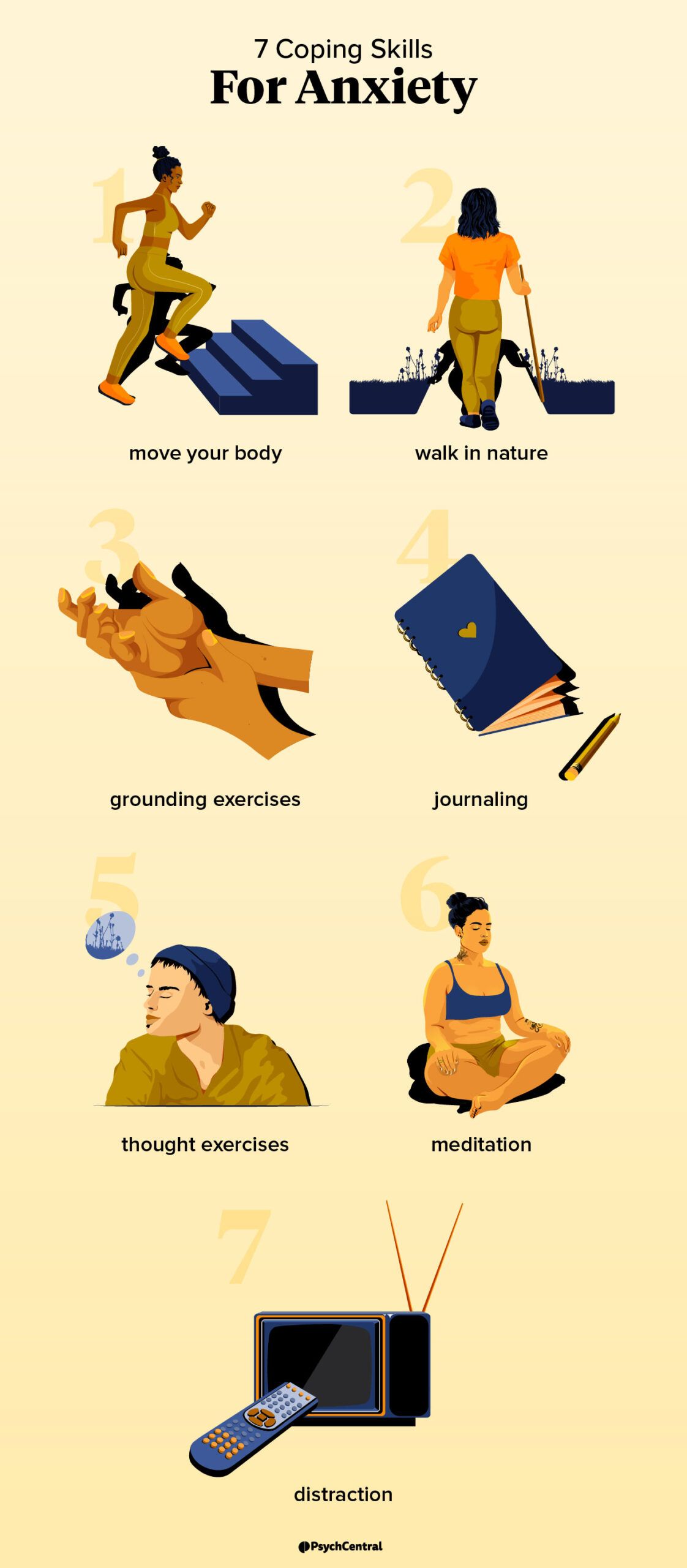Coping with Anxiety: Practical Tips to Manage and Overcome It
Anxiety is a natural response to stress, but when it becomes overwhelming, it can significantly impact your day-to-day life. Whether it’s caused by work, personal challenges, or general life changes, learning to cope with anxiety is essential for maintaining both your mental and physical health. In this article, we’ll explore effective ways to manage anxiety, practical tips, and proven coping strategies that can help you regain control.
:max_bytes(150000):strip_icc()/VWH-JulieBang-HowToDealWithAnxiety13WaysToCope-4000x2700-f881c81b93974defb879e4715132f690.png)
Understanding Anxiety
Anxiety is a feeling of worry, nervousness, or unease about something with an uncertain outcome. It is a normal emotion experienced by everyone, but for some, it becomes a persistent issue. Generalized Anxiety Disorder (GAD), panic attacks, and other forms of anxiety disorders can disrupt daily life if not managed.
While it’s common to feel anxious before big events like a presentation or job interview, chronic anxiety can affect your ability to function effectively. By recognizing symptoms and understanding your triggers, you can better manage your emotional state and reduce anxiety.
Symptoms of Anxiety
Some common symptoms of anxiety include:
-
Excessive worry
-
Rapid heart rate
-
Difficulty concentrating
-
Sweating or trembling
-
Fatigue
-
Irritability
Understanding these signs is the first step toward addressing anxiety.
1. Practice Mindfulness and Meditation
Mindfulness involves focusing on the present moment, helping you disengage from overwhelming thoughts that fuel anxiety. It encourages you to observe your thoughts without judgment and lets you develop a greater awareness of your emotional state.
How to Practice Mindfulness:
-
Set aside 10 minutes a day to focus on your breath.
-
Pay attention to physical sensations or sounds around you.
-
Use guided meditation apps to get started, or try breathing exercises.
By practicing mindfulness regularly, you can create mental space to break free from the cycle of anxiety.
:max_bytes(150000):strip_icc()/manage-your-anxiety-2584184-01-07daf91ba6de41d19f827cf65ceef07a.png)
2. Exercise to Release Stress
Physical activity is one of the most effective natural anxiety relievers. When you exercise, your brain releases endorphins, which act as natural mood boosters. Regular exercise reduces tension, improves sleep, and enhances self-confidence.
How to Get Started:
-
Aim for at least 30 minutes of physical activity daily.
-
Choose exercises that you enjoy, whether it’s walking, yoga, cycling, or dancing.
-
Start slow and gradually build up intensity to avoid overwhelming yourself.
Exercise not only helps alleviate anxiety in the moment but also improves long-term mental health.
3. Deep Breathing Techniques
When you’re feeling anxious, your body goes into “fight or flight” mode, triggering shallow, rapid breathing. Deep breathing exercises activate the body’s relaxation response, helping you calm down and reduce anxiety.
How to Practice Deep Breathing:
-
Find a quiet place and sit or lie down comfortably.
-
Slowly inhale through your nose for a count of four, hold for a count of four, then exhale through your mouth for a count of four.
-
Repeat for several minutes, focusing on your breath and letting go of tension.
Deep breathing techniques can help you regain control during moments of heightened anxiety and improve your overall emotional regulation.
4. Use Positive Self-Talk
Your thoughts play a crucial role in your emotional state. If you constantly tell yourself that you are not capable or that everything will go wrong, you reinforce feelings of helplessness. Positive self-talk can shift your mindset and help you feel more in control.
How to Practice Positive Self-Talk:
-
Replace negative thoughts with positive affirmations, such as “I can handle this” or “I am doing my best.”
-
Challenge irrational beliefs by asking yourself, “Is this thought based on facts?”
-
Surround yourself with supportive people who uplift you.
By changing your internal dialogue, you can reduce anxiety and build greater self-confidence.
5. Limit Caffeine and Alcohol Intake
Both caffeine and alcohol can exacerbate feelings of anxiety. Caffeine is a stimulant that can trigger symptoms like restlessness, nervousness, and increased heart rate. Alcohol, though initially relaxing, can worsen anxiety and disrupt your sleep.
How to Manage Intake:
-
If you consume caffeine, limit your intake to the morning and opt for low-caffeine alternatives like herbal tea.
-
Avoid alcohol, especially before bed, as it interferes with your sleep cycle and can cause anxiety the following day.
Reducing caffeine and alcohol can have a significant impact on how you feel and help your body return to a more balanced state.

6. Get Enough Sleep
Sleep and anxiety are closely linked. Lack of sleep can increase anxiety levels and worsen stress, making it harder to manage your emotions. When you sleep well, your mind and body can reset, making it easier to handle daily challenges.
How to Improve Your Sleep:
-
Stick to a consistent sleep schedule, going to bed and waking up at the same time each day.
-
Create a relaxing bedtime routine, such as reading or taking a warm bath.
-
Avoid using electronics before bed, as the blue light can interfere with sleep quality.
Prioritize your sleep to restore your energy and mental clarity.
7. Connect with Others
Socializing can provide emotional support and reassurance during stressful times. Whether it’s talking to a friend or joining a group therapy session, connecting with others can make you feel less isolated and more supported in your anxiety management journey.
How to Build a Support System:
-
Reach out to friends or family members who can offer a listening ear.
-
Consider joining support groups or online communities focused on anxiety.
-
Share your feelings and be open to advice or encouragement.
Human connection plays a key role in reducing feelings of anxiety and promoting mental wellness.
8. Practice Gratitude
Focusing on the positives in life helps shift your attention away from worries. By practicing gratitude, you can train your mind to focus on what you have, not what you lack. This shift in perspective can reduce anxiety and increase feelings of well-being.
How to Practice Gratitude:
-
Keep a daily gratitude journal, writing down three things you’re grateful for each day.
-
Reflect on the good things in your life, no matter how small they may seem.
-
Share your gratitude with others to strengthen your relationships.
Gratitude exercises can help you develop a more positive outlook and reduce anxious thoughts.
FAQs About Coping with Anxiety
How do I know if my anxiety is serious?
If your anxiety interferes with daily activities, causes physical symptoms like heart palpitations, or lasts for an extended period, it might be time to seek professional help. Consult with a healthcare provider for proper evaluation and treatment.
What is the fastest way to calm anxiety?
Deep breathing, grounding exercises, and mindfulness are some of the quickest ways to calm anxiety. These techniques can help you return to the present moment and regain a sense of control.
Can anxiety be cured?
While there is no “cure” for anxiety, it can be effectively managed with the right coping strategies. Many people find relief through therapy, lifestyle changes, and mindfulness practices.
Is it normal to feel anxious sometimes?
Yes, occasional anxiety is a normal part of life. However, if it becomes chronic or severe, it may indicate an anxiety disorder that requires attention.
Conclusion
Coping with anxiety is a journey that requires patience and persistence. By implementing these effective strategies, such as practicing mindfulness, exercising regularly, and fostering positive self-talk, you can regain control over your thoughts and emotions. If anxiety continues to affect your life, remember that seeking professional help is a great step toward healing.
For additional tips and resources on managing anxiety, check out our article on how to improve mental wellness.









